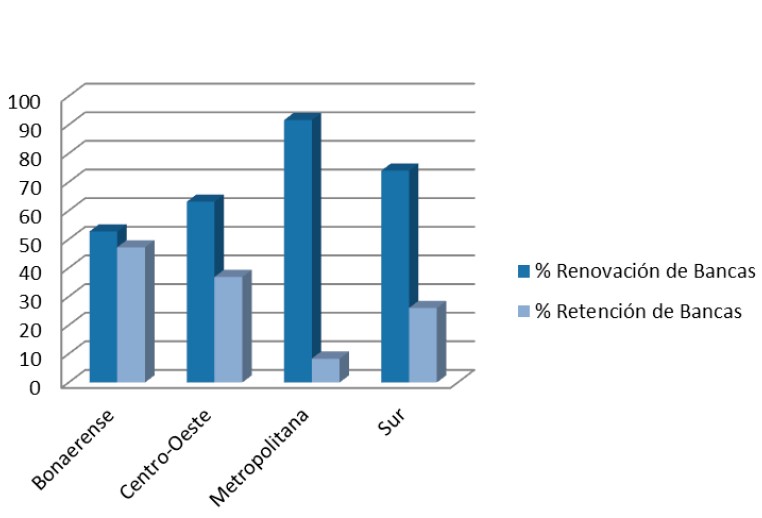The representation of the teaching faculty in the university government Is there alternation?
DOI:
https://doi.org/10.29312/remexca.v13i5.3235Keywords:
co-government, election, renewalAbstract
The exercise of the representation of a certain sector in the government bodies has motivated numerous studies regarding the legitimization of the will of the voter by the representative, as well as respect for the will delegated to those representatives. In the particular case of the National Universities of the Argentine Republic, university co-government and unrestricted admission are two of the principles of university autonomy that are defended and sustained with greater force in the pronouncements of all the faculties that make up said co-government. However, this highly democratic system, although it is of a meritocratic nature given that the weight of representation by faculty is not equal because of the premise that the greatest weight in decision-making should fall on those who would be more prepared for it, the way in which the representation of the faculties is exercised and the renewal of those who exercise it could deteriorate or alter the purpose pursued by whoever occupies that place in representation of the interests of a sector of the university community. In this work, the representation of the teaching faculty in the superior council of a sample of six Argentine national universities, between 2011 and 2017, is analyzed, inquiring about how this representation occurs and is maintained between the different electoral processes. It is concluded that there is a tendency towards a greater repetition of those who exercise the representation in the largest universities or in some of the territorial regions with which the National University System is formed. At the same time, a strong male predominance was found both in the representation with the character of incumbent in the superior council and in the repetition rate in the function.
Downloads
References
Carrasco, D. M. 2018. Las listas electorales desde una perspectiva de derecho comparado. Rev. Chilena de Derecho y Ciencia Política. 9(1):9-44. Doi: 10.7770/rchdycp-v9n1-art1480.
González, E. A. 2010. El poder en las organizaciones. ¿De eso no se habla? Publicado en la Rev. Enfoques. (Ed.). La ley. 43-49 pp.
Innerarity, D. 2018. Comprender la democracia. La democracia presupone una ciudadanía que comprende y observa críticamente la política. ¿Estamos en condiciones de hacerlo? 1ra (Ed). Gedisea, SA. Barcelona. 80-92 pp.
Kandel, V. 2005. Formas de gobierno en la universidad pública: reflexiones sobre la colegiación y la democracia. En estudios sobre políticas universitarias en américa latina. Buenos Aires: CLACSO. 279-282 pp. http://biblioteca.clacso.edu.ar/clacso/becas/20110124083718/ 7kendel.pdf.
Ley N° 27.275.2016. Honorable Congreso de la Nación. Ley de derecho de acceso a la información pública. Boletín Oficial N° 33.472. República Argentina. http://servicios.infoleg.gob.ar/ infolegInternet/anexos/265000-269999/265949/norma.htm.
Pérez, L. A. 2017. La educación superior Argentina. Diagnóstico y prospectiva. Buenos Aires, Argentina. Eudeba. 70-87 pp.
Przeworski, A. 2019. Por qué tomarse la molestia de hacer elecciones. Pequeño manual para entender el funcionamiento de la democracia. Siglo Veintiuno Editores. 54-78 pp. ISBN: 978-987-629-895-7.
Rissi, M. y Oloriz, M. G. 2017. La participación de las autoridades unipersonales en los cuerpos colegiados universitarios. Comunicación presentada en XVII Coloquio Internacional de Gestión Universitaria, Mar del Plata. ARG. 22-24 pp. ISBN 978-987-544-804-9.
Rissi, M.; Oloriz, M. G. y Ferrero, E. L. 2018. Relación entre el crecimiento del sistema universitario nacional y la participación de las mujeres en los cuerpos colegiados. Comunicación presentada en XVIII Coloquio Internacional de Gestión Universitaria, Loja. ECU. 22-24 pp. ISBN:978-85-68618-05-9.
Rissi, M.; Oloriz, M. G. y Ferrero, E. L. 2018. Existe relación entre el tamaño de la Institución y la participación de las mujeres en los cuerpos colegiados. Congreso Internacional de Escritores: literatura, poética y ciencia. Universidad Autónoma de Chapingo, México.
Rosanvallon, P. 2015. Tenemos democracia electoral, pero no de ejercicio. Diario. Buenos Aires Argentina. 12 p. https://www.pagina12.com.ar/diario/elmundo/4-287172-2015-11-29.html.
Unzué, M. y Emiliozzi, S. 2006. La escasez de profesores. Diario. Buenos Aires Argentina. 12 p. https://www.pagina12.com.ar/diario/universidad/10-66086-2006-04-26.html.
Vega, R. I. 2008. La Universidad Argentina: Una institución en crisis. Rev. FACES de la Facultad de Ciencias Económicas y Sociales de la Universidad Nacional de Mar del Plata. 2(2):102-110.
Vega, R. I. 2010. Decisiones en la Universidad Pública. Buenos Aires, EUDEM. 17-45 pp.
Villazón, J. 2013. Los mismos partidos políticos los mismos candidatos de siempre. Infórmate. Salta publicado en la sección de Política. https://informatesalta.com.ar/contenido/ 39347/los-mismos-partidos-politicos-los-mismoscandidatos-de-siempre.

Published
How to Cite
Issue
Section
License
Copyright (c) 2022 Revista Mexicana de Ciencias Agrícolas

This work is licensed under a Creative Commons Attribution-NonCommercial 4.0 International License.
The authors who publish in Revista Mexicana de Ciencias Agrícolas accept the following conditions:
In accordance with copyright laws, Revista Mexicana de Ciencias Agrícolas recognizes and respects the authors’ moral right and ownership of property rights which will be transferred to the journal for dissemination in open access. Invariably, all the authors have to sign a letter of transfer of property rights and of originality of the article to Instituto Nacional de Investigaciones Forestales, Agrícolas y Pecuarias (INIFAP) [National Institute of Forestry, Agricultural and Livestock Research]. The author(s) must pay a fee for the reception of articles before proceeding to editorial review.
All the texts published by Revista Mexicana de Ciencias Agrícolas —with no exception— are distributed under a Creative Commons License Attribution-NonCommercial 4.0 International (CC BY-NC 4.0), which allows third parties to use the publication as long as the work’s authorship and its first publication in this journal are mentioned.
The author(s) can enter into independent and additional contractual agreements for the nonexclusive distribution of the version of the article published in Revista Mexicana de Ciencias Agrícolas (for example include it into an institutional repository or publish it in a book) as long as it is clearly and explicitly indicated that the work was published for the first time in Revista Mexicana de Ciencias Agrícolas.
For all the above, the authors shall send the Letter-transfer of Property Rights for the first publication duly filled in and signed by the author(s). This form must be sent as a PDF file to: revista_atm@yahoo.com.mx; cienciasagricola@inifap.gob.mx; remexca2017@gmail.
This work is licensed under a Creative Commons Attribution-Noncommercial 4.0 International license.


